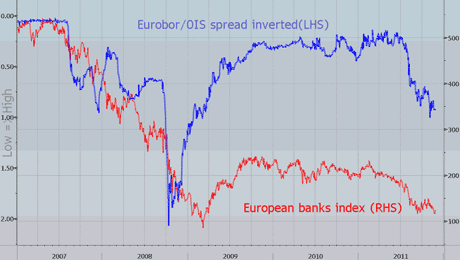European stocks have had a big rally today. There are – once again – renewed hopes of another bailout deal for the region’s bankrupt countries.
But we’ve heard all that type of talk many times before, so we won’t be getting too excited yet. Meanwhile, there’s a crucial sub-plot here. Europe’s banks are running out of cash. And the problem is getting worse.
What’s happened is this. Because banks in the EU are loaded up with dodgy eurozone sovereign debt, they’re facing huge write-offs. That will knock gaping holes in their balance sheets. So they’re finding it much tougher to borrow money for their day-to-day needs.
As the FT points out today, bond issuance by Euroland banks in 2011 is just two-thirds of what these institutions will have to repay to their creditors this year. In other words, that will leave Europe’s lenders with a $241bn hole. It’s the first time this has happened for five years.
And the near–term picture is even worse. US money-market funds – one of the major sources of cash – are now only prepared to lend to EU banks on a very short-term basis. For example, these funds’ exposure to French banks has been slashed by 69% since May.
Add up all the numbers, and Europe’s lenders now have a total ‘funding gap’ of $2 trillion, according to Ambrose Evans-Pritchard in the Telegraph.
Ouch. What does this all mean for investors? Look at this chart of the European bank ‘fear gauge’.

Source: Bloomberg
The red line is the European banks index. As you can see, it’s been plunging recently. And the major catalyst is the blue line. This is a classic market fear gauge: the Euribor/OIS spread. It’s the difference between what banks charge each other for three-month dollar loans (seen as riskier) and the overnight indexed swap rate, a key short-term (low risk) interest rate guide.
Note that on the chart, the blue line has been inverted. In other words, the more it falls, the wider the Euribor/OIS spread – and the greater the risks that the market smells in the European banking sector. In turn, the red line is then falling even more as investors become more and more jittery about the solvency of EU-based lenders.
Sure, there are still hopes that an 11th hour ‘solution’ will be found. But even at best, Europe’s banks will still have to raise extra capital to plug their balance sheet holes. And further losses are being racked up by the day. So many EU bank shareholders are set to see their investments drop yet further. It means that any share prices rallies would be a good time to sell.
There may be some other opportunities in Europe, though. Next Friday’s MoneyWeek magazine features our latest European Roundtable. And having had a sneak preview of what our experts will be discussing, I can assure you it’ll be well worth reading.
Category: Market updates

